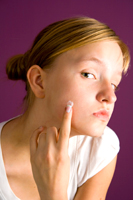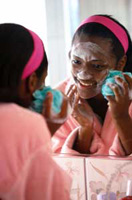- Body
- Fitness
- Nutrition
- Illness &
disability-

- Types of illnesses and disabilities
- Dealing with medical issues
- Coping with your feelings
- Taking care of your body
- Dealing with school
- Relationships
- Becoming independent
- For friends and family
- Stories, celebrities, chats, and other fun stuff
-
Quiz: How much do you know about taking good care of yourself?
-
-
Links to more information
-
-
- Drugs, alcohol
& smoking - Your
feelings - Relationships
- Bullying
- Safety
- Your
future - Environmental
health
Skip section navigation (navigation may have changed)
Section navigation

http://www.girlshealth.gov/
Body
Acne

Whether you call them pimples, zits, or acne, lots of young teens find skin problems confusing and upsetting. But you can understand what’s going on with your skin — and what you can do about it.
Acne often starts during puberty because your body is making more oil glands. Sometimes, acne is also caused by bacteria. Here’s a closer look at a few common kinds of acne.
Whiteheads develop when a hair root (called a follicle) gets plugged with oil and dead skin cells.
Blackheads happen when this plugged-up stuff comes to the surface of the skin and the air touches it. The black is not dirt.
Pimples develop when a plugged-up follicle breaks near the surface of the skin.
Cystic acne happens when the plugged follicle breaks deep inside the skin. Nodules (inflamed bumps) or cysts (pus-filled bumps) form and often look like larger pimples. Sometimes they can cause scars and pain.
Remember that acne is common among teens — you’re not the only one dealing with it. Of course, everyone won’t have the same troubles. Some people just have more sensitive skin. And acne can run in your family, so if your mom or dad had it, you may too. Severe acne sometimes can be a sign of hormone problems, so ask your doctor if you’re concerned.
There are lots of options for dealing with acne.
- First, you can wash your face twice a day with a mild soap or cleanser. You might also wash it after you sweat a lot. (But washing it more than two or three times a day can irritate your skin.) You can also lessen the oils on your face by keeping your hair clean if it’s oily.
- If the acne doesn’t go away, you can buy over-the-counter products. These gels, lotions, and creams fight acne with ingredients like benzoyl peroxide, resorcinol, salicylic acid, and sulfur. You may need to use these products regularly for several weeks before they work. If they don’t lessen your acne after two months, ask your doctor for help. Also, let your doctor know if you have a bad skin reaction to any of these products.
- If over-the-counter medicines don’t work well, your doctor may give you prescription medicine. These medicines could include an antibiotic cream or a gel or cream made with a type of medicine called a retinoid. Prescription treatments also could include an antibiotic pill or possibly even a birth control pill. If you use a retinoid or antibiotic pill, make sure to stay in the shade and use sunscreen because these increase the risk of sunburn.
- If other treatments don’t work, your doctor may give you Accutane. This is a strong medicine, so discuss with your doctor whether it’s right for you.
Warning: The medicine Accutane can cause some serious health problems. These include possibly having a baby with birth defects if you get pregnant. Other acne treatments may have pregnancy-related risks, too. If there’s a chance you could get pregnant, discuss those risks with your doctor. If you do get pregnant, tell your doctor right away.
What can make acne worse?

- Using oil-based makeup instead of “non-comedogenic” ones that may not clog pores
- Using suntan oil and oil-based hair products, including pomade
- Your period
- Picking at your pimples
- Scrubbing your skin too hard
- Getting too much sun
What doesn’t cause acne?
You may have heard that eating lots of fried foods and chocolate or having lots of sex can cause acne. Researchers say that’s not true. Of course, it’s still smart to skip unhealthy behaviors just to take good care of yourself.
Content last updated October 13, 2010





